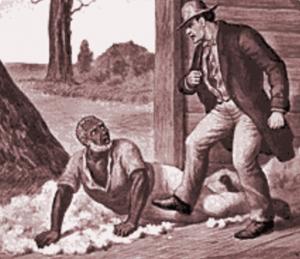Since the theology of the politicized American right is essentially derivative Calvinism (with a heavy dose of Gnosticism and a measure or millenarianism to boot), it is not surprising that Catholics who align themselves with this movement should fall sway to Calvinist arguments. Nowhere is this more clear than with First Things. And I don’t want to go after the easy targets here: Michael Novak’s wholesale embrace of laissez-faire liberalism or Richard John Neuhaus’s selective reading of Catholic social teaching. No, in this post I want to to point to a couple of more blunt instances of appalling theology on the pages of First Things— pertaining to American exceptionalism and health care, respectively.
One of the contributors to to magazine is Stephen Webb, who recently penned a review of Bush speechwriter Michael Gerson’s Heroic Conservatism. He writes the following with nodding approval:
“Gerson shares with the president a providential reading of history. Like Bush, Gerson is convinced that freedom is the goal of history—because he believes that freedom is God’s gift to everyone.”
Who is Stephen Webb? Well, the article links to an interesting book he has written, entitled American Providence: A Nation With A Mission. The book, hailed by Neuhaus, is described in the following terms:
“American Providence makes the case that American Christianity is not an oxymoron. It makes the case for a robust doctrine of providence-doctrine that has been frequently neglected by American theologians due to their reluctance to claim any special status for the United States. Webb goes right to the heart of this reluctance by defending the idea that American foreign policy should be seen as a vehicle of God’s design for history.”
As I’ve noted before, more than any other country today, Americans tend to fuse Christianity with an invented civic religion, and, sooner or later, it all comes back to the idea of American exceptionalism, the notion that America is somehow ordained by God and held to a different standard. And, more often than not, the underlying theology is derivative Calvinism, including a very un-Catholic reading of the Old Testament. For these early American settlers viewed the new land as favored by God, much as ancient Israel had been in Old Testament times. They viewed themselves as the “elect”. And America was their country.
This idea has affected American foreign policy from the earliest days of manifest destiny. Woodrow Wilson, the son of a Calvinist minister, believed that the United States had been chosen by God to teach the world to walk in the “paths of liberty.” John Foster Dulles, a Presbyterian elder, was deeply committed to the notion that America was a providential nation. Ronald Reagan who re-evoked Winthrop’s city-on-a-hill speech, viewing America as pure and the Soviet Union as an “evil empire”. And George Bush, embracing American exceptionalism on steroids, desiring to re-make the world under the tutelage of the United States.
This theology resonates deeply among the American evangelical culture today. There was much outcry over Jerry Falwell’s comments after 9/11, when he was accused of blaming abortion, gays etc. for the catastrophe. But what Falwell really said was that God had withdrawn his shroud of protection from America. That presupposes that God was protecting America in a way that other countries could not access. But this is not consistent with the Catholic faith, and I have no idea why a Catholic magazine like First Things is peddling it.
Exhibit B is slightly older, a essay by Peter Leithart mocking Obama’s concern with health care provision. Lethart blames this “obsession” on secular humanism, which “cannot see how any good could emerge from human suffering” and “worship[s] the body itself”. This then is the reason that “politicians, as well as the media, routinely accord priority to items of health-care policy.” His bizarre conclusion is that “pain may be good for you” and that focusing on health care is misplaced. How does this square with the Catholic teaching that health care is a basic right? It doesn’t, because the theology is again a form of derivative Calvinism. Leithart’s punchline is the following:
“Christianity was founded in an act of expiatory pain, has regarded human suffering as not only inseparable from the nature of life on earth, as a matter of observable fact, but also as a necessary condition in spiritual formation.”
What is wrong with this statement? Well, Catholic faith was not founded in an act of expiatory pain. Jesus founded and taught Catholic faith, which he made effective through an expiatory sacrifice followed by resurrection, overcoming the effects of sin and uniting humanity to himself. We have been saved by sacrifice, not pain. The pain was an incidental evil and a reflection of our sins. By the way, Mel Gibson does not seem to get this either, which is the main reason I did not like his movie on the Passion. Again, really bad theology on the pages of First Things.












